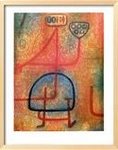. . . but calling ZiZou a "terrorist" is really gonna hurt.
Am I alone in feeling sadly ruminative since the final? In part, of course, because it's over now, and we all have to wait another four years -- not just the U.S. team. Well, not quite. Like the summer and winter Olympics, the European championships take place in the off-even years between the World Cup (the next tournament in 2008): a stop-gap for those of us who support European sides (and also fear having to see our sides play Argentina and Brazil).
But the dust -- and our stomachs? -- haven't yet settled over Zinedine Zidane's precipitous sending off on Sunday. Accounts from the conventional press have by and large (1) made it the sub-hedder (2) only referred, ever so briefly, to an "exchange of words" between Materazzi and Zidane (3) have not reported what those words were and (4) attempted simultaneously to venerate Zidane (from pre-match copy planned for "farewell" encomia?) and to condemn him for his actions.
Oddly, I can relate to the journalistic schizophrenia -- who hasn't furrowed their brow, and yet felt peculiarly gratified, upon hearing that Zidane was awarded the Golden Ball of the tournament? It doesn't feel right, and yet . . . hmmm.
Here's where my site monitor becomes an interesting index of where the conventional press is missing the ball. Many are arriving here now due to Google searches the likes of "reason head-butt Zidane," "Zidane sending off Materazzi," "why Zidane headbutt red card."
People are looking for answers.
In the most crass, or "crash," sense -- the kind that makes us leer at car wrecks -- people are looking for the actual words Materazzi said. After all, we know why Zidane was sent off -- a head-butt for the ages. We want to know what made him lunge. In Aristotelian terms, we know the material cause, what the thing is. What we're after are the efficient and (I suppose the pun here is inevitable) the final causes, what made the event happen, and why.
And it's not just the conventional press that's being evasive. Zidane himself (as of this writing) has not come forward to report what was said. Yet witness the wonder of Materazzi's own statement:"It is absolutely not true, I did not call him a terrorist," Materazzi told Italian news agency Ansa.
"I'm ignorant. I don't even know what the word means.
"The whole world saw what happened on live TV."
Is Materazzi speaking philosophically here? Can we really believe that a 32-year-old European man does not know what the word "terrorist" means? I've devoted ample space in this blog to conducting translations (could we really be dealing with language barriers here?), but cannot come up with a lexicon to interpret these words, spoken in Anno Domini 2006.
A friend recently praised my posts on the World Cup, specifically how I haven't "lapsed into academic density." I fear I am regressing here, but also fear that we're seeing density abound -- on the part of Materazzi, on the part of the press, on the part of those who would feel Zidane were somehow justified (if that's indeed what Materazzi called him), as well as those who pontificate that there's "no excuse" for Zidane's actions.
So for those looking for answers, I have none here (density indeed), only guesses and hunches at how this incident is playing in our murky post 9/11 world.
My gut tells me that journalists are being evasive because no small part of us wants to shield this revered athletic competition from the real-world troubles of terrorism. I wonder, in fact, whether FIFA -- whose motto for the tournament was "A time to make new friends . . . Say no to racism" -- has been working round the clock to discourage inquests and analyses of this kind. ZiZou said no, all right. We all witnessed it. His reaction taps into our doubts about how exactly one should respond to terrorism (a problem we can only trust our leaders are working round the clock to solve).
His violent response, however, strikes us as intolerable, especially when we acknowledge that he was responding -- only? -- to words. Here's where the PC police (the Anti-Defamation League?) ought to issue a statement, if (only) to clarify for us when and how language really matters. Is there such a thing as verbal terrorism? Or are crimes against property the only ones we can prosecute?
Several weeks ago, I was taken aback when I unrolled the morning's Chicago Sun-Times to two competing headlines: on the top, in bold red, "Sears Tower Terrorist Plot" (discovered and foiled), taking up a quarter, maybe a third of the front page; more than half of the page was devoted to the Chicago White Sox coach Ozzie Guillen's MLB suspension, for his indecorous characterization of sports columnist Jay Marriotti. This struck me as wrong, that the ill-chosen words of a baseball coach should be allotted more space than a terrorist plot that would have affected all of Chicagoland, if not the nation and the world. Then, as now, though, I stopped to consider the power of words, and whether my personal response was justified. After all, a PhD in English, and a specialist in its history, my business is language, and my job entails trumping up its significance.
The doctor has no answers here, however, only more questions.
¶ What should Zidane have done, under the circumstances? Lunge for the ball, not Materazzi, for sure, but how else can one respond to such despicable slurs? Hail the ref? Tell the press? The situation calls for fresh analyses of a tournament previously, and widely, excoriated for the practice of diving.
¶ Would printing what Materazzi said have been tantamount to endorsing it? Does repressing language effectively negate its import, or only call more attention to it? I think of the old BBC injunction on IRA operatives: that is, perversely, the BBC would dub the voices of Sinn Fein leaders with that of a properly English speaker. I hardly think the policy prevented another Omagh or Enniskillen.
True to form (i.e., not shying from controversy), English tabloids such as the Daily Mail have employed lip-readers (conversant in Italian, no less) to translate what Materazzi said. And yet, I myself feel squeamish about reprinting them, or even supplying the links. I have to think about it. For now, however, you know what to search for. . . hope it gives you some answers.



4 comments:
Terrorist plot on the Sears Tower? Really? I'm MORE shocked that the arrest of these "terrorists" was news at all. They had no weapons. They had no plan. They had no detailed information about the Sears Tower. They had no ties to Al Qaeda. But yes, they talked about blowing up the Sears Tower! Thanks for saving us, Department of Homeland Security!! And for publicizing your terrific efforts!!
Apparently the US govt is pretty invested in the power of words too. They apparently reveal what you MIGHT do, sometime in the distant future. And for that, you can go to jail.
Ha, GREAT POINT, Karen. The abuse of words there lay in the DHS trumping up its detection of a do-nothing, go-nowhere plot. GREAT GREAT point.
Just feel I need to point out that it wasn't a BBC policy that prevented Gerry Adams voice being used. It was actually a law put in place to frustrate the IRA "message". Useless? Yes... but not some bizzare attempt to keep accepted pronuciation on the BBC.
Thanks for posting -- I knew the policy had to do with suppressing the IRA, but tend to be interested in the linguistic side of these matters, or the relationship of language standards to other forms of policy.
Check out this excellent (and more recent) line of discussion on Steven Poole's Unspeak, during which I am additionally (and gratefully) educated on the BBC broadcast policy . . .
Post a Comment